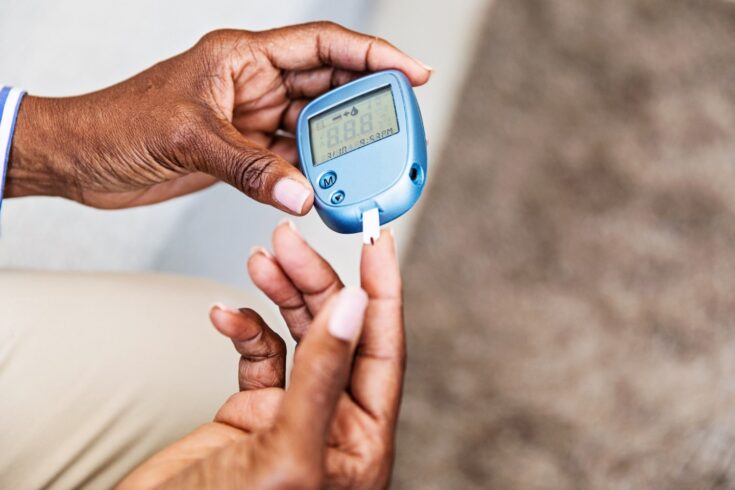The project was funded by the Medical Research Council (MRC) as part of its precision medicine initiative to ensure that the right drug is given to the right patient, at the right time.
The study, published in the Lancet, has developed an innovative way of identifying the most effective glucose-lowering drugs for a person with type 2 diabetes. By predicting which drug will lead to the largest reduction in blood glucose levels, the easy-to-use tool could pave the way for better health for millions, at the push of a button.
Careful management of blood glucose levels is essential for reducing the risk of serious diabetes complications. However, keeping blood glucose levels in a safe range can be challenging, with only about a third of people with type 2 diabetes meeting targets.
Urgent need for new approaches
With diabetes-related complications devastating lives and costing the UK healthcare system £6.2 billion every year, there is an urgent need for new approaches to improve blood glucose management.
In England alone, more than three million people with type 2 diabetes use glucose-lowering drugs to manage their condition. While metformin is the most common first treatment, five other major types of glucose-lowering drugs are available.
However, their effectiveness varies widely from person to person and it has not been possible to determine the best glucose-lowering treatment for each patient until now.
The new tool was created to tackle the challenge of which drug to choose after metformin. It was developed and tested using data from one million people with type 2 diabetes in the UK, linking GP and hospital records, with its accuracy verified with data from clinical trials.
The research revealed that only 18% of people with type 2 diabetes in the UK have been treated with the most effective glucose-lowering drug for them.
Reduction in blood glucose levels
Modelling showed that starting people on the drug recommended by the new tool could lead to marked reductions in blood glucose levels at one year, of around five millimole or mole on average.
Importantly, these improvements in blood glucose levels could approximately double the time until people need to start taking further diabetes medications. The tool’s use was also predicted to lower risks of developing serious long-term diabetes complications including heart attacks, strokes and kidney disease.
Using routinely collected clinical information, the tool offers a low-cost, practical, immediately usable solution that could transform the treatment of type 2 diabetes.
For millions of people with type 2 diabetes, its use would ensure they receive the best treatment to help keep their blood sugars in target range and minimise their risk of developing life-limiting complications.
An impact on a person’s wellbeing
Dave Pomfrey, 67, from Hampshire, was diagnosed with type 2 diabetes 27 years ago. Dave was told he would need medication to manage his blood glucose levels and help reduce the risk of complications. Dave shared:
The prospect of taking medication, potentially for life, along with the threat of complications was worrying. But having seen the impact of health complications faced by my relatives, who also had type 2 diabetes, I was willing to try anything.
Over the years, I have experienced many changes to my medication to keep my blood glucose levels within range. Getting the most appropriate treatment as early as possible and reducing the back and forth of trying different medications could have such an impact on a person’s wellbeing.
The tool’s performance in clinical practice is currently being assessed in 22,500 patients with type 2 diabetes across Scotland, which will inform its roll-out across the UK and globally. This will enable a new era of personalised treatment for people with type 2 diabetes.
A major advance on the current approach
Dr John Dennis, Associate Professor at the University of Exeter who led the study, said:
We have developed a completely new personalised approach for diabetes treatment, that could benefit everyone with type 2 diabetes in the UK and worldwide.
For the first time, our model allows people living with type 2 diabetes to quickly identify the best treatment to manage their blood sugar levels, helping reduce their risk of diabetes complications. This offers a major advance on the current approach to choosing diabetes medications.
Using simple measures that are performed routinely
Professor Andrew Hattersley from the University of Exeter, who was a study author, added:
Critically, our model can be implemented in clinical care immediately and at no additional cost. This is because it uses simple measures such as sex, weight and standard blood tests that are performed routinely.
We hope that we can roll out the model quickly to make it available to help people with type 2 diabetes in the UK and across the world.
Huge potential to improve patient outcomes
Dr Adam Babbs, Head of Translation at MRC, which was a funder of the study, said:
This study is a trailblazing example of why we’re backing research into the next frontier in medicine: the development of precision medicine, which ensures that the right patient receives the right therapy at the right time.
With large variation between individuals with type 2 diabetes in how they respond to treatments, and many different treatments available, precision medicine like this has huge potential to improve patient outcomes and provide efficiencies for the healthcare system.
The researchers were funded by MRC, Wellcome and National Institute for Health and Care Research Exeter Biomedical Research Centre, and supported by Diabetes UK.

